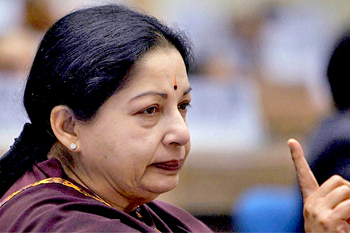Chennai, Jun 11: Tamil Nadu Chief Minister J Jayalalithaa has questioned the Centre for "entertaining" Kerala's request for approving environment study to construct a new dam at Mullaperiyar in her state, saying it was in contravention to the Supreme Court order.
 In a letter to Prime Minister Narendra Modi, she said the approval of Terms of Reference to conduct an Environmental Impact Assessment Study for the construction of a new dam at Mullaperiyar, was in "gross violation" of a Supreme Court order on this issue.
In a letter to Prime Minister Narendra Modi, she said the approval of Terms of Reference to conduct an Environmental Impact Assessment Study for the construction of a new dam at Mullaperiyar, was in "gross violation" of a Supreme Court order on this issue.
She also sought Modi's intervention in the matter.
In a letter dated June 10, Jayalalithaa said this was in "violation of the Constitution Bench Order of the Supreme Court," as Kerala was seeking Centre's approval" for the Environmental Impact Assessment study for construction of the new dam in place of the existing structure.
Kerala's act was in "utter contempt" of the May 2014 Supreme Court order which had held that the existing Mullaperiyar Dam was structurally, hydrologically and seismically safe and had "negatived in unequivocal terms, the offer of Kerala for the construction of a new Mullaperiyar Dam", she said.
Kerala's review petition on this issue had also been dismissed and a "finality" reached on the matter but the state government was "seeking to subvert" the apex court order by "stealth", seeking approval of the Terms of Reference to conduct the Environmental Impact Assessment study, she said.
The Tamil Nadu government's interlocutory application in Supreme Court seeking to restrain Kerala from conducting the study was scheduled to come up next month, Jayalalithaa said in the letter which was released by the government today.
At this juncture, it was "understood" that the Union Ministry of Environment, Forests & Climate Change, had, in a meeting, examined the Terms of Reference suggested by Kerala for conducting the study for construction of a new Mullaperiyar Dam, she said.
She said the Ministry of Environment, Forests & Climate Change, has informed vide the Press Information Bureau's press release dated 4.6.2015, that no approval has been granted for carrying out Environmental Impact Assessment study for construction of a new Mullaperiyar Dam in Idukki District of Kerala.
However,".... I would like to point out that the very fact of entertaining the Government of Kerala's request and considering the same by the Government of India for approving the Terms of Reference to conduct an Environmental Impact Assessment Study for the construction of a new dam is itself a gross violation of the Decree and Order of the Supreme Court dated 7.5.2014."
"In fact, the Government of India should have desisted from entertaining and considering the proposal and ought to have remitted the proposal back to the Government of Kerala," she said.
Under "these circumstances", Jayalalithaa sought Modi's personal intervention, requesting him to instruct the Ministry of Environment, Forests & Climate Change and its agencies, "to desist from entertaining and considering the proposal of Kerala government in future and also to negative to the proposal and return it to Kerala."





Comments
Add new comment